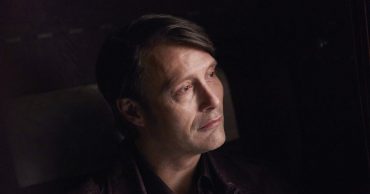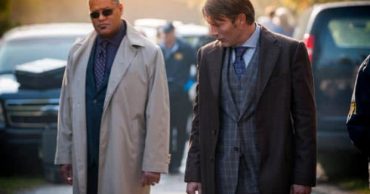
Memory and trauma are inextricably linked. In the time following a traumatic event, memory plays a massive role in determining how someone deals with that trauma–using memory, for instance, actively in the healing process instead of suppressing it. When trauma is shared, memory becomes more complicated and multifaceted. Since we all have our own subjective memories of something, the nature of a shared traumatic event and our relationships with it become different from one another. “Aperitivo” showcases how the various characters of Hannibal live on after the trauma they endured in Season 2. Most want revenge on Hannibal Lecter for different reasons, and all of them firmly pursue the path they feel is best for them at this point. While the episode functions mostly on the expositional level, catching viewers up with the lives of Will, Jack, Bella, Alana, Chilton, Mason and Margot, it also asks us to think not only about how these characters have changed, but also how these changes relate to one another.
Being more literal, some of those changes are physical. The opening conversation between Chilton and Mason Verger (recast for this season and played by Joe Anderson) highlights some of that physical trauma that is either directly tied to Hannibal (in the case of Mason) or indirectly tied to him (in the case of Chilton). All of these characters have their various scars, but the ones belonging to these two are much more noticeable on the surface level, which is respectful of how Hannibal treats its secondary characters in ways that don’t let them feel totally secondary. In fact (and as you’ll see below), Chilton and Mason dominate the episode based on number of lines of dialog. Chilton, especially, is used in “Aperitivo” in a major role that allows him to act as the core and conduit of everyone else’s trauma. He is the one whose life is, perhaps, the most changed, even admitting to Will that he’s learning new things about himself. So, while Mason may look (and sound) different, his actions and motivations aren’t too far off from the psychopath we were introduced to last year. Chilton, however, finds himself in self-discourse. He wants to get back at Hannibal, but certainly not in the way that Mason does. He feels sympathy for his colleague, Alana Bloom, but he is too shaped by his own failings to allow him to express anything other than understanding, I-told-you-so cynicism towards her. He sees what he believes is Jack’s lack of focus and wants to make him to acknowledge that he has cut bait with Will, letting him dangle on his own, but he recognizes Jack’s need to separate himself from everything to be with his dying wife. More than anything, he wants to help Will, but not just because Will is the key to getting Hannibal back. Chilton’s eyes (well, his one good one, anyway) are open to how closely tied he is to Will Graham now. Even if Hannibal as a series will never allow a schmuck like Chilton to be a proper Will surrogate, Chilton’s experiences mirror Will’s, “Aperitivo” giving the character a moment in the spotlight to sub-textually say something akin to “Hey, this is my story, too. These are my sorrows that also need to be borne.” Raul Esparza brings a charisma to the whole thing that is impossible not to laugh along with, but the serious underpinnings of his character are just as important to understanding the power of Hannibal’s evil visited upon the rest of the cast.
Even though he really wants to be able to share in Will’s experience, Chilton’s processing is still a few steps behind Graham’s, which is mainly because Will got closer to Hannibal than anyone else did. That is not made any clearer than when Jack visits Will, asks about why Will let Hannibal know that they were coming for him in “Mizumono” and gets the response: “Because he…because he…he was my friend…and because I wanted to run away with him.” Much of Season 2, for the viewer, was spent questioning Will’s complicity and how malleable his ethics were. How far was Will going? How far should we think Will would go? At what point does Will lose our sympathy? Now, we have more information that may make some of those questions easier to answer. Will really was ready. He didn’t sit down to dinner and help kill Jack Crawford, but that fantasy isn’t a “what if?” It’s a “how close was I to this?” That speaks to the power of Hannibal’s influence, but it also speaks to Will’s self-doubt in the face of everything that has happened in this series, bringing this back around to the idea of how severely violence can damage the consciousness of someone–tenfold for someone with an empathy disorder whose job it is to imagine killing people. Hannibal Lecter offered Will a way out to run away with someone who understood him and could help bear that burden. From a television standpoint, we were a thousand miles away from that version of the narrative. On paper, though, that decision could have been made by a real-life Will Graham with a coin flip. This is the way I see Will’s change at this point. The Will of Season 2, like Jack, was so intent on getting the job done. It was personal, of course, but Hannibal needed to be exposed by any means necessary. Much of that happened in a blind rage that no longer persists after the months of rehabilitation and consideration. Will spends time in the kitchen where he was gutted, trying to reconnect with lost friends–Abigail being perhaps the only person other than Hannibal who would be able to help Will make sense of his own feelings. That moral limbo is less ambiguous because of “Secondo,” since we see Will force Chiyoh’s hand and into his quest to find Hannibal, but “Aperitivo” shows that the means of getting to that place required that Will question everything he thought he knew about himself. And he doesn’t learn that until after this episode, chronologically, since the Will on that boat is travelling to answers just as much as he’s travelling to Italy.
Jack’s change fits into a similar structure: strip everything away to build the character back up again. Forced into early retirement, Jack doesn’t have any of the fiery passion that used to define his character. Sometimes quick to anger, the Jack who simply takes in Will’s admission about wanting to run away with Hannibal is contemplative, not judicial. It puts him into a mental space where he’s finally able to appreciate Bella’s wish to not be forced to linger on in life in pain. When he comes home and she has not woken up when she usually does, her situation worsening just a little bit, he gives her her peace and finally allows himself to grieve over her. It’s a stunning piece of art, from the moments in which he’s cradling her dying body to the splicing of her body being prepared in conjunction with his dressing for the funeral and continuing into his wedding fantasy and the reality of her death. Bella has been such a strong character in so many ways, and it makes me wonder if Jack was using her strength as his own, now left with the need to create a new kind of strength that can allow him to survive on without her. Like Will, he doesn’t have definitive answers in this episode and has to follow him to Europe in hopes of something igniting. It’s an incredibly vulnerable Jack Crawford, which humbles the character at a time when other characters’ egos are getting the better of them.
That mainly leaves Alana Bloom, whose mindspace is probably so messed up that it’s difficult even trying to analyze it. First, she allowed herself to get romantically close to Hannibal, which is horrific in a way unto itself. But I have to imagine that the governing thought in her head is something she shares with Miriam Lass: “How could I be so wrong?” She’s not so vulnerable as Jack as to let that thought get the better of her and diminish her into overwhelming feelings of guilt, but that absolutely where she could have gone if she was less strong-minded. And that’s because she was wrong all along and Will was right. The reality of that has got to be almost impossible to acknowledge, and we see Alana dealing with in this episode by being an ally to Mason in his attempts to bring down Hannibal in a way that Hannibal would approve of: consumption. That means, though, that she’s the one character who represents the denial or suppression side of the trauma equation. It’s how she has to deal with things right now. She has to respect Will’s desire to be left alone, and she has to find whatever personal recompense she can for the thorough deceit that Hannibal ran her through. I think I might have been in the minority of viewers who didn’t think Alana’s role last season was trivialized, since her decisions seemed pretty logical based on the character’s history and her dialog in those episodes. But now, more than ever, she appears to have a clearly defined set of goals in a part of the story that is isolated from both Will Graham and Hannibal Lecter. None of these characters are ever really that far away from each other, and they are on a crash-course to coalesce once again. “Aperitivo” just gives them their own starting points, letting them arrive at that coalescence in their own time and on their own terms.
Bite-Sized Thoughts: Buon appetito!
– “You show me yours, and I’ll show you mine.” Apart from the Chilton-Mason dialog being deliciously comedic, this also echoes one of Will and Margot’s meetings last season, in which they show each other their scars.
– Similarly, Chilton’s dialog with Will after Will wakes up in the hospital echoes what we saw in “Primavera” with Abigail. The extent to which Will continues to envision the life he could have had with Hannibal and Abigail is rather heartbreaking.
– “Imitation allows us to better understand the behavior of others.” I guess everyone is trying to understand someone else in this series, then.
– Hey! Winston (and the other dogs) are still around! Alana’s watching them now (by Will’s request?), but who was watching them while everyone was recovering?
– Defenestration: the act of throwing someone or something out of a window.
– There is some heavy flirtation between Margot (an established member of the LGBTQ community) and Alana in that stable. Double entendres aside, just look at the body language.
– This entire review could have easily been a tribute to Gina Torres and her work as Bella Crawford. I’m not ruling out flashbacks, but treating this as the character’s end, it’s appropriately unsatisfying. There’s nothing Hollywood about it, Bella getting some kind of last speech or whatever. She just gets worse and worse and dies without even knowing she’s going to die. Fantastic character, fantastic performance since the beginning.
– The letter that Jack receives from Hannibal includes excerpts from John Donne’s “A Feaver” (interestingly enough, Donne was also called “Jack” Donne when regarding his earlier, more erotic work).
– It is noted in the script that Jack survived, because he didn’t pull that glass out of his neck. This has got to be somewhat meta, because so many people in TV shows die because of this mistake.
Hannibal by the Numbers:
Speaking roles in “Aperitivo”
1. Chilton, 76 lines
2. Mason, 63 lines
3. Alana, 49 lines
4. Jack, 47 lines
5. Will, 35 lines
6. Bella, 11 lines
7. Margot, 10 lines
8. Cordell, 9 lines
9. Hannibal, 4 lines
10. Doctor, 2 lines
11. Abigail, 1 line
Total: 307 lines
26 total scenes
Longest scene by line count: Will’s conversation with Chilton in the hospital, 41 lines.
Shortest scene by line count: 8-way tie, 0 lines.
Longest scene by running time: Will’s conversation with Chilton in the hospital, 3 min. 33 sec.
Shortest scene by running time: Will sailing on the ocean, 0 min. 13 sec.
Average running time per scene: 1 min. 36 sec.
[Photo via NBC]
 Follow Us
Follow Us






I know there’s supposed to be something between Alan & Margot, but I don’t recall any double-entendre.
Normally, periods of reflection & contemplation are supposed to bring one to more reasonable conclusion. But Will even considering murdering Jack and running off on some murder vacation seems idiotic to the point you’d think he had brain damage. This is the guy who couldn’t even sit by and let Freddie Lounds get murdered, and he hates Freddie Lounds.
I suppose it’s easy to read suggestively into pretty much anything, but the dialog I was referring to was Margot telling Alana “This can be your entrance. It isn’t easy to find the first time you come.”
And agreed on the Will assessment. It’s hard for me to believe that fantasy, since I resist the idea that Will would really want those things with Hannibal at the end of the day, but it’s even harder to deny Hannibal’s influence, given all the examples we’ve seen of strong-willed characters falling under it. If we didn’t already know the story of Red Dragon, what do you think this Will Graham would do when he finds Hannibal? Because I’m not so sure anymore.
The chief example of someone falling under Hannibal’s sway is Abigail Hobbs, who had already been coerced into being an accomplice to multiple homicides by her father. Hannibal arranged to create a situation in which she did something that could be perceived as damning and tied one of his own misdeeds (knocking out Alana) to create a shared secret, guilt and incentive to keep it all under wraps. In some ways, contra Alana, it’s the opposite of blackmail and similar to the M.O of a child molester. Randall Tier also came under Hannibal’s influence as a child. Will is not a child, and Jack had already decided to tolerate the most indefensible Hannibal-related acts he got up to (Hannibal should not have been permitted to assist while under investigation, a cleared Will who admits attempting to murder their target much less so). That leaves Bedelia, whose situation has parallels with Abigail but whose motivations/plan still remains a mystery.